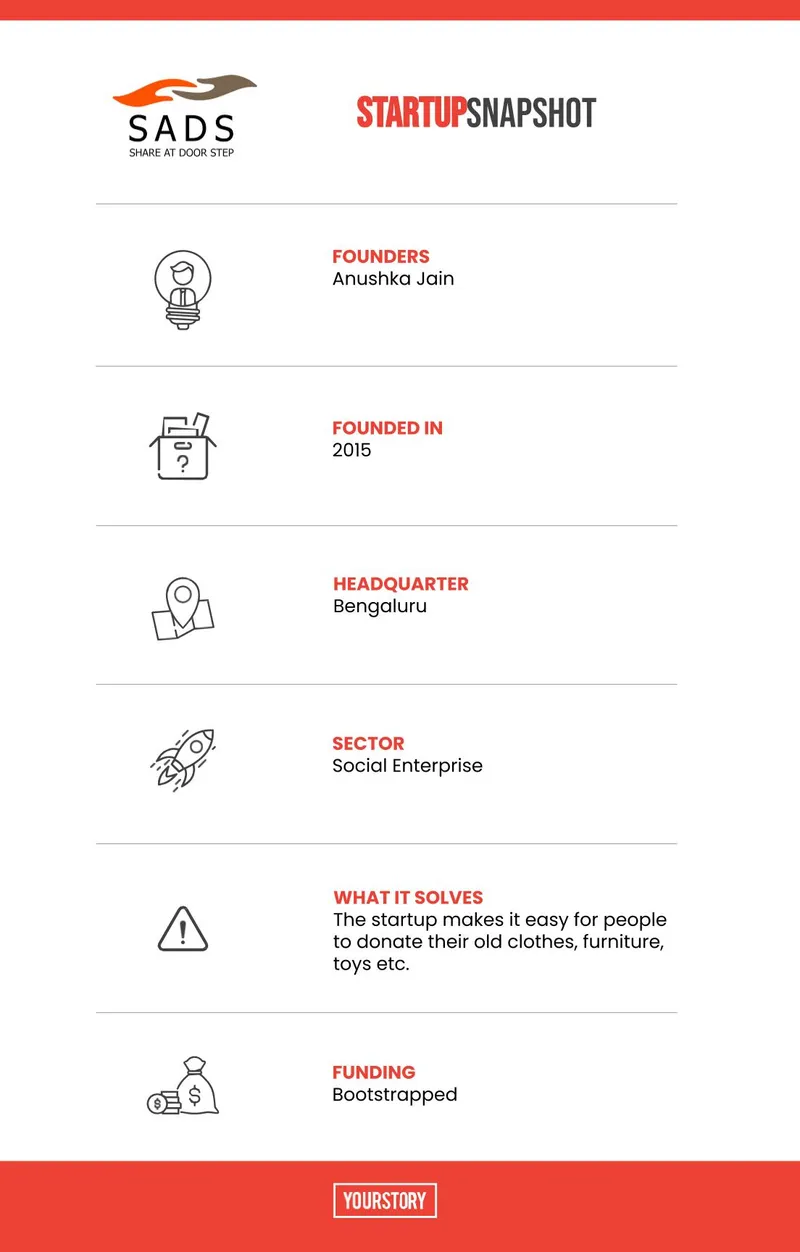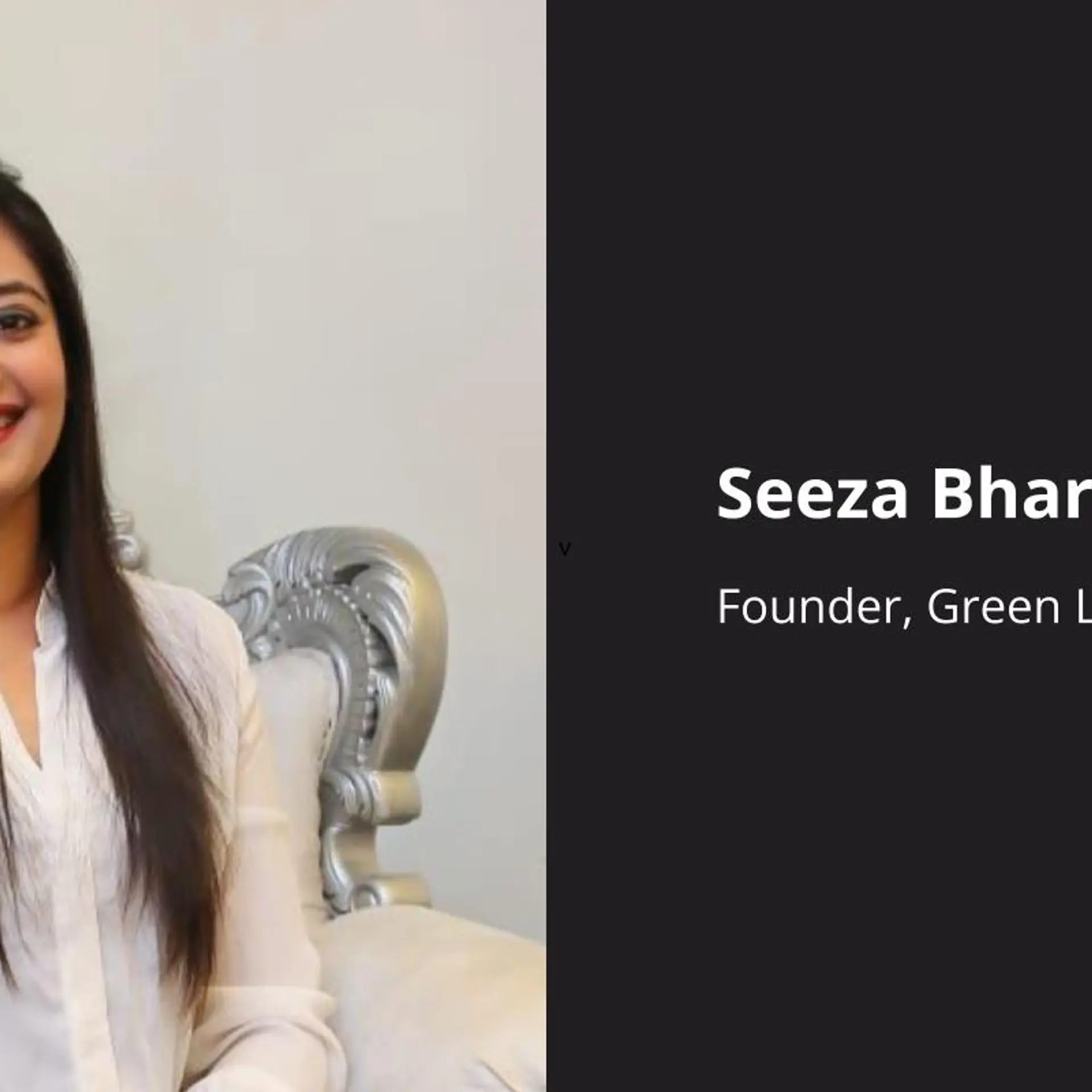[Tech50] How this startup makes it easy for you to give away your old clothes, toys, and furniture
Share at Door Step (SADS) is YourStory Tech50 2021 startup that makes it easy for people to donate their old clothes, furniture, toys etc.
As a child, Anushka Jain would always wonder why her mother donated old clothes only during Anushka’s birthday. Why wasn't it a recurring thing? “I wondered if my mother was lazy or was she simply busy? Only when I grew older did I realise there wasn’t an easy way to donate unwanted goods."
It was this early memory that got her to start Share At Door Step (SADS) in 2015 out of Bengaluru. The YourStory 2021 Tech50 startup makes it easy for anyone to donate their old toys, clothes, electronics and furniture and earn rewards for the donations they make.
Today, is operational across 11 major cities, including Delhi-NCR, Bengaluru, Mumbai, Hyderabad, Pune, Chennai, Kolkata, Surat, and Chandigarh.
“We have limited operations in 600+ cities (light pickup option only). We support 120+ NGOs across India,” says Anushka. The platform works as a cause-commerce platform.
The workings
It took the team time to figure out the right profit with purpose model to ensure that the company is self-sustainable. Anushka explains a focus on tech along with ‘profit with purpose’ worked as a USP for SADS.The team automated the model to stay asset light and scalable.
The SADS platform allows users to schedule a pickup for their products within 30 seconds. They can do this through the website, MyGate or PhonePe app. The platform’s NGO mapping algorithm then balances the demand and supply.
“The algo assigns the NGO in real time for each order based on the requirements of the NGOs in the hub, quantity of donations, urgency, geo location, availability during the assigned slot etc. This makes the model capital light and sustainable,” says Anushka.
They also provide light, medium to heavy and collection drive options to facilitate donation pickups for all kinds of reusable goods- clothes, toys, books, mattresses, furniture, electronics, prams, exercise equipment, office or school supplies etc.
“We started our operations with volunteer driven pickups, moved to having in-house logistics and eventually did API integrations with the logistics partners - Dunzo, Wefast (now Borzo), Delhivery, Pikkol, and others to expand across India. We also partnered with Blowhorn and Porter for express adhoc requests. The whole process is fully automated now and that made us win the trust of people as we offered transparency and ease to our clients in the market that’s super fragmented,” says Anushka.
Why build this?
With her research Anushka had realised most of the products that are purchased are used only for 1/3rd of their lifetime, and for the remaining part, they are just stocked up in closets.
Further research also showed her that India has Rs 8000 to Rs 19,000 worth unwanted products. And globally this is between $750 and $3500. And while people prefer to donate the products they don't use, there is no easy way to do the same.
“Hence, people dispose-off the reusable items randomly or just throw them away. Close to 85 percent of it goes to landfills even though 45 percent is reusable,” explains Anushka.
She explains if these items are used, they would be able to not only decrease the carbon emissions by up to 27 percent but also be able to support over 252 million people with the basic necessities. Another challenge was time. People simply cannot drive to different places and hunt for the right NGO. There also is no awareness of what the NGO’s requirements were. A tech answer seemed easy to Anushka.
The core team member Prasad Paradkar was working with Anushka in my previous employer CureJoy. He is the person behind the amazing tech we have at SADS. He has 16+ years experience in building products and have worked with multiple startups as core team member.

Business models
SADS is focussing on B2C and B2B2C approach and they work on a commission basis. The convenience fee is Rs. 199 onwards for a light pickup (based on distance) and Rs. 699 onwards for medium to heavy pickup (based on the volume).
The team, so far, has facilitated donations for over 1 million users through supporting 120+ NGOs. They have worked with 100+ companies/brand partners including ITC, Narayana Health, Snapdeal, Nautica, The Chopras, Freecharge, Soti, Akamai, Randstad, Crack Verbal, GSK, Uber, LinkedIn, Society General etc.
The collaboration terms and charges are based on the budgets of the clients and their requirements.
“The collaboration terms depend on their focus areas - awareness of causes (environmental or social) or any specific CTA. Our cause marketing model for B2C brands has worked really well for brands that are trying to connect with their customers at a deeper level. The deal size can vary from a few lakhs to Rs 1.5 Crore,” says Anushka.
The team has over 20-35 percent margins depending one the revenue stream and type of collaboration.
They have integrated logistic partners APIs so that the requests are automatically sent to our logistics partner and through the best route algorithm pickups can be made in the most efficient and cost effective manner.
On the rewards side, the users earn “Share points” based on the carbon emissions reduced each time one donates through the platform. For the recommendations, they use collaborative filtering (machine learning techniques) to provide the most relevant rewards- exclusive vouchers, goodies or experiences - for the users.
The pandemic work
When the pandemic hit, the team realised that they could look at helping the society better. They launched several initiatives like:
- Virtual classroom: In partnership with Cashify, SADS help provide mobile phones to the underprivileged children. The old phones are turned into new ones, and support over 1000 children to continue their online learning.
- Go Circular 100 to engage remote employees: For the corporate employees, this program helps engage employees of 100 companies by facilitating sponsored donation pickups from the homes of employees while they are working remotely. LinkedIn, Societe Generale, etc. are a few companies that have signed up for the same.
- #KnotsOfCare - The team worked with brands like Nautica to facilitate free donation pickups from their customers and support the NGOs working for COVID-19 affected communities.
Market and team
According to a report published by market research company NOVONOUS, India’s waste management market will be worth $ 13.62 billion by 2025. Startups like Brown Living, Zwende, BlessedBuy, and Tjori fall under both niche and sustainable ecommerce category.
“The whole process is fully automated now and that made us win the trust of people as we offered transparency and ease to our clients in a market that’s super fragmented,” says Anushka.
Future plans
Currently the team rewards users each time they discard their unwanted goods through SADS. In future, users would be rewarded for making other sustainable choices such as - buying eco-friendly products, shopping from ethical brands, opting for cleaner energy sources, etc.
"Our vision is to create a "Fitbit" for sustainability - an app that helps people achieve their sustainable living goals by tracking and incentivising their everyday actions. Through the app, we would be expanding to the US market and a few parts of Europe focussing towards environmentally conscious consumers. We plan to use blockchain and ML to make the individual sustainability actions transparent, auditable and quantifiable (in terms of carbon footprint) and connect carbon credits for B2C actions,” says Anushka.
Edited by Anju Narayanan


![[Tech50] How this startup makes it easy for you to give away your old clothes, toys, and furniture](https://images.yourstory.com/cs/2/721b1c100eb911eb936a1114ea00a5c0/NewBrandingCopyEditorialTeamMaster5-1640709108268.jpg?mode=crop&crop=faces&ar=2%3A1&format=auto&w=1920&q=75)
![[Tech50] How after losing her younger sister, this entrepreneur started a braintech startup](https://images.yourstory.com/cs/2/77e43870d62911eaa8e9879653a67226/Neuphony-1640094846086.jpg?fm=png&auto=format&h=100&w=100&crop=entropy&fit=crop)
![[Tech50] How this Hyderabad-based startup aims to touch over 1.5 lakh Indian villages with its ‘phygital’ network](https://images.yourstory.com/cs/2/a9efa9c02dd911e9adc52d913c55075e/offsite-1639375314539.png?fm=png&auto=format&h=100&w=100&crop=entropy&fit=crop)




